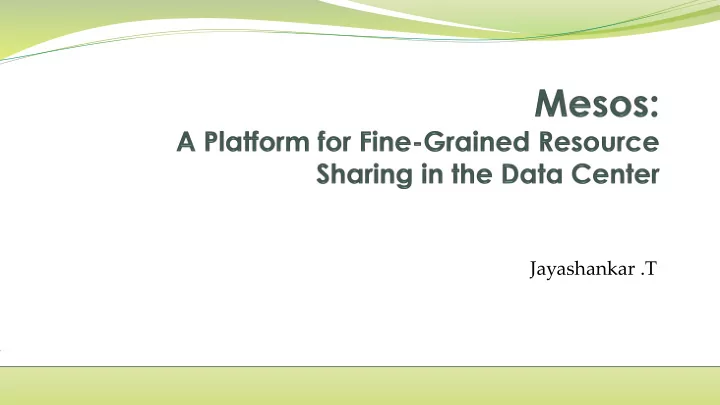

Jayashankar .T
Agenda Motivation & Problem Statement Design Architecture Scheduling Resource Offer Fault Tolerance Evaluation Comparison
Motivation Many Cluster Compute Frameworks are available today Single framework do not suffice all applications
Cluster: a “Precious” Resource One Cluster to Rule Them All !!
Typical Problem Facebook’s Hadoop data warehouse 2000 nodes cluster Fair scheduler for Hadoop Workloads are fine-grained, so task level resource allocation Optimum data locality Only runs Hadoop L Can it run other frameworks fairly and efficiently ?
What do we want? We want to run multiple frameworks on our cluster Sharing improves cluster utilization: 1. Applications share access to large datasets 2. Costly to replicate across distinct nodes
Common Cluster Sharing Solutions Static Partitioning: run one Assign VMs to each framework per partition framework Concerns: Non optimal cluster utilization Inefficient data sharing (e.g. unnecessary replication)
Mesos Platform for sharing clusters between multiple computing frameworks Can run multiple instances of same framework Provide isolation between production and development environment Concurrently running several frameworks Support any new specialized frameworks Be scalable and reliable at the same time
Mesos Design Provide minimal interface for resource sharing across frameworks Offload task scheduling and execution onto frameworks Thus, Frameworks have the liberty to implement diverse solutions to problems Keeping Mesos Simple, becomes robust, scalable, manageable and stable Although expectation is to have high-level libraries on top Mesos for fault tolerance (keeping Mesos small & flexible)
Mesos Architecture
Resource Offer Allocator on Master and Executor on Slave Step1: slave provide resource info Step2: offer made to framework Step3: Framework presents task Steps4: Master sends task to slaves
Resource Offer Mesos doesn’t require frameworks to specify their requirements Frameworks can reject the offer, if it does not stratify constraints and can decide to wait To prevent framework from waiting too long, frameworks can set filters Example: will never accept offer with less than 8G memory Filters optimize offer model
Mesos Characteristics Filter can be directly provided at master to short circuit offer process Resource offered is Resource allocated Every offer has timeout for acceptance – Master rescinds the offer after that Pluggable Allocation Module, support for flexible allocation policy Fair sharing policy: Frameworks with Small Tasks wait less Strict Priorities Guaranteed Allocation: task revocation wont happen for certain frameworks (interdependent like MPI) Isolation is achieved through OS container
Fault Tolerance Master has to be fault tolerant: Master is designed to be soft state, new master can reconstruct internal state from slaves and framework schedulers Master stores: active slaves, active frameworks and running tasks Multiple masters run in hot standby and Zookeepers is used for leader election Node and executor failure are reported to framework, to be taken care Scheduler failure is overcome with framework registering multiple schedulers for redundancy
Resource Sharing
Data Locality with Resource Offers • Mesos use “delay scheduling”: wait for limited time for specific local nodes else continue
Scalability
Limitations and Overcoming them Starvation of large tasked frameworks Allocation modules support a minimum offer size on each slave, and abstain from offering resources on the slave until this amount is free Interdependent Frameworks: framework using data generated by other Such scenarios are rare in practice. frameworks only have preferences over which nodes they use, and can have filters for specific nodes Complex Frameworks: schedulers have to be smart to judge resource offers Job type and time can not be predicted to have a centralized scheduler
Mesos v Borg Less Control and Simple Complex but Better Control Very less start up overhead More Start up Latency Frameworks have to be Framework/Applications modified to support Mesos need be changed much “Mesos = Borg – Scheduling”
Mesos v YARN YARN makes the decision where jobs should go, Thus it is modeled as a monolithic scheduler. Running YARN over Mesos: Project YARN Manager Myriad Executor Mesos Slave
References MESOS Project http://mesos.apache.org/documentation/latest/ USENIX Video https://www.usenix.org/conference/nsdi11/mesos-platform-fine-grained- resource-sharing-data-center
Additional slides
Centralized v Distributed Scheduling
Mesos Architecture
Mesos APIs
Mesos Ecosystem Mesosphere – DC/OS: datacenter operating system Mesosphere – Marathon: container management system Airbnb -- Chronos: scheduler for Mesos, eases the orchestration of jobs
Recommend
More recommend